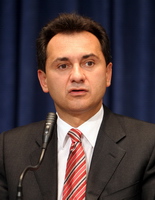- Serbia
Get to know Serbia
- Citizens
Culture and science
Health services
Pension and disability insurance
- Business
Employment
Economy
- Media
- Government
- Contact
Keep in touch
Contact form
Back
Keepin touch
Whether you have a question, comment, suggestion or any problem in the purview of the government, send us your message and we will try to respond as soon as possible. If your problem is not in our purview, we will forward your message to the relevant institution.
Q:
A:
Serbia aspires to repeat Slovakia’s transition success
Belgrade/Bratislava,
19 August 2008
Deputy Prime Minister Bozidar Djelic stated in an interview for the Slovakian daily Hospodarske Noviny that Serbia aspires to repeat Slovakia’s success in transition and be ready for EU membership by 2014.
Djelic said it would be illogical if Brussels blocked Serbia’s road to EU by demanding the extradition of Hague indictee Ratko Mladic, adding that in the last several months Serbia has evidently done all it can to fulfil its international obligations.
He stressed that Belgrade cooperates with the Hague Tribunal despite the fact that the court has enraged many by acquitting former commanding officer of the Kosovo Liberation Army Ramus Haradinaj and former commanding officer of Muslim forces in Srebrenica Naser Oric, who committed crimes against Serbs.
Djelic noted that after the Irish "No" at the referendum on the Lisbon Agreement on reforms of European institutions it is somewhat harder for Serbia to continue with the EU integration process.
A change in the EU’s stance towards the Western Balkans is evident. For instance, France amended its Constitution in late July so that Serbia cannot join the EU without a referendum, he explained.
We take this as a welcome signal from Europe. We are focused on being prepared for membership by 2014, he said and noted that Serbia wishes to repeat Slovakia’s successful transition which clearly showed that it was ready to overcome a difficult position within five or ten years.
We really admire Slovakia because it will enter the euro zone even before the Czech Republic, Hungary or Poland, and because it implements difficult reforms which bring dividends, explained Djelic.
Bold reforms are often painful, therefore the Deputy Prime Minister appealed to EU members to vote for the Stabilisation and Association Agreement with Serbia on September 15.
He voiced hope that once Serbia is closer to Europe, the international community will be able to better understand Serbia’s arguments on Kosovo-Metohija.
According to him, Serbia wants the international community to do as Slovakia does – to respect international law when it comes to Kosovo.
At the autumn UN General Assembly we want other countries to support our initiative to renew dialogue, said Djelic.
According to him, Serbia will not resort to force to defend its territory in Kosovo-Metohija but wants to respect international law, and consequently it expects respect in return, as well as support to Belgrade in order to reach a historical compromise with Pristina.
He stressed that Belgrade cooperates with the Hague Tribunal despite the fact that the court has enraged many by acquitting former commanding officer of the Kosovo Liberation Army Ramus Haradinaj and former commanding officer of Muslim forces in Srebrenica Naser Oric, who committed crimes against Serbs.
Djelic noted that after the Irish "No" at the referendum on the Lisbon Agreement on reforms of European institutions it is somewhat harder for Serbia to continue with the EU integration process.
A change in the EU’s stance towards the Western Balkans is evident. For instance, France amended its Constitution in late July so that Serbia cannot join the EU without a referendum, he explained.
We take this as a welcome signal from Europe. We are focused on being prepared for membership by 2014, he said and noted that Serbia wishes to repeat Slovakia’s successful transition which clearly showed that it was ready to overcome a difficult position within five or ten years.
We really admire Slovakia because it will enter the euro zone even before the Czech Republic, Hungary or Poland, and because it implements difficult reforms which bring dividends, explained Djelic.
Bold reforms are often painful, therefore the Deputy Prime Minister appealed to EU members to vote for the Stabilisation and Association Agreement with Serbia on September 15.
He voiced hope that once Serbia is closer to Europe, the international community will be able to better understand Serbia’s arguments on Kosovo-Metohija.
According to him, Serbia wants the international community to do as Slovakia does – to respect international law when it comes to Kosovo.
At the autumn UN General Assembly we want other countries to support our initiative to renew dialogue, said Djelic.
According to him, Serbia will not resort to force to defend its territory in Kosovo-Metohija but wants to respect international law, and consequently it expects respect in return, as well as support to Belgrade in order to reach a historical compromise with Pristina.
-
 Belgrade/Brussels, 19 November 2025
Belgrade/Brussels, 19 November 2025European integration shared responsibility of entire society
-
 Belgrade, 29 October 2024
Belgrade, 29 October 2024State moves to minimise advertising for betting shops
-
 Belgrade/Berlin, 28 January 2016
Belgrade/Berlin, 28 January 2016Fences cannot stop migrations
-
 Belgrade, 7 January 2016
Belgrade, 7 January 2016Serbia to experience dynamic economic growth in 2016
-
 Belgrade, 31 December 2015
Belgrade, 31 December 2015Serbia will persevere on path of development, reforms
-
 Belgrade, 30 December 2015
Belgrade, 30 December 2015Ground for Serbia’s progress set
-
 Belgrade, 28 December 2015
Belgrade, 28 December 2015Serbia ready for improvement of cooperation with Russia
-
 Belgrade, 22 December 2015
Belgrade, 22 December 2015Serbia ready to open six more chapters next year
-
 Belgrade, 21 December 2015
Belgrade, 21 December 2015Serbia to be part of EU by 2020
-
 Belgrade, 20 December 2015
Belgrade, 20 December 2015Serbia ready for EU membership by 2019


